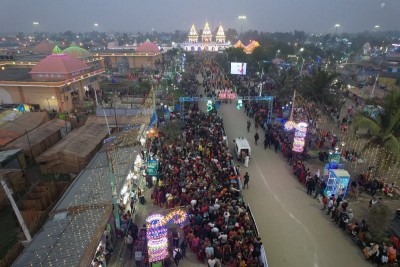 India-G20
India-G20
India to assume G20 Presidency from Dec 1
New Delhi: India will assume the Presidency of the G20 for one year from Dec 1 to Nov 30.
Under its Presidency, India is expected to host over 200 G20 meetings across the country, beginning December 2022, read the statement issued by the Ministry of External Affairs.
The G20 Leaders' Summit at the level of Heads of State / Government is scheduled to be held on 09 and 10 September 2023 in New Delhi.
The G20, or Group of Twenty, is an intergovernmental forum of the world’s major developed and developing economies. It comprises 19 countries (Argentina, Australia, Brazil, Canada, China, France, Germany, India, Indonesia, Italy, Japan, Republic of Korea, Mexico, Russia, Saudi Arabia, South Africa, Turkey, UK, USA) and the European Union (EU). Collectively, the G20 accounts for 85% of global GDP, 75% of international trade and two-thirds of the world population, making it the premier forum for international economic cooperation.
India is currently part of the G20 Troika (current, previous and incoming G20 Presidencies) comprising Indonesia, Italy and India. During our Presidency, India, Indonesia and Brazil would form the troika. This would be the first time when the troika would consist of three developing countries and emerging economies, providing them a greater voice.
The G20 currently comprises:
(i) Finance Track, with 8 workstreams (Global Macroeconomic Policies, Infrastructure Financing, International Financial Architecture, Sustainable Finance, Financial Inclusion, Health Finance, International Taxation, Financial Sector Reforms)
(ii) Sherpa Track, with 12 workstreams (Anti-corruption, Agriculture, Culture, Development, Digital Economy, Employment, Environment and Climate, Education, Energy Transition, Health, Trade and Investment, Tourism)
(iii) 10 Engagement Groups of private sector/civil society/independent bodies (Business 20, Civil 20, Labour 20, Parliament 20, Science 20, Supreme Audit Institutions 20, Think 20, Urban 20, Women 20 and Youth 20).
In addition to G20 Members, there has been a tradition of the G20 Presidency inviting some Guest countries and International Organizations (IOs) to its G20 meetings and Summit. Accordingly, in addition to regular International Organizations (UN, IMF, World Bank, WHO, WTO, ILO, FSB and OECD) and Chairs of Regional Organizations (AU, AUDA-NEPAD and ASEAN), India, as G20 Presidency, will be inviting Bangladesh, Egypt, Mauritius, Netherlands, Nigeria, Oman, Singapore, Spain and UAE as Guest countries, as well as ISA (International Solar Alliance), CDRI (Coalition for Disaster Resilient Infrastructure) and ADB (Asian Development Bank) as Guest IOs.
Whilst our G20 priorities are in the process of being firmed up, ongoing conversations inter alia revolve around inclusive, equitable and sustainable growth; LiFE (Lifestyle For Environment); women’s empowerment; digital public infrastructure and tech-enabled development in areas ranging from health, agriculture and education to commerce, skill-mapping, culture and tourism; climate financing; circular economy; global food security; energy security; green hydrogen; disaster risk reduction and resilience; developmental cooperation; fight against economic crime; and multilateral reforms.
Support Our Journalism
We cannot do without you.. your contribution supports unbiased journalism
IBNS is not driven by any ism- not wokeism, not racism, not skewed secularism, not hyper right-wing or left liberal ideals, nor by any hardline religious beliefs or hyper nationalism. We want to serve you good old objective news, as they are. We do not judge or preach. We let people decide for themselves. We only try to present factual and well-sourced news.







